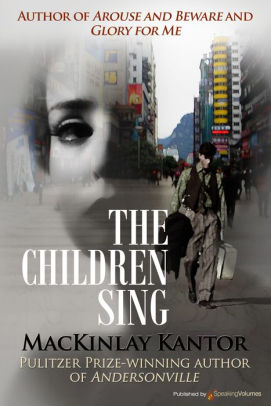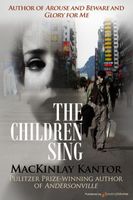- Welcome to FictionDB, Guest
- | My Account
- | Help

The Children Sing — Mackinlay Kantor
In The Children Sing MacKinlay Kantor -- winner of the Pulitzer Prize for Fiction for his novel Andersonville -- ventures into the field of the parading mural, taking a colorful group of people through Eastern Asia into a crucible of challenge and excitement.
Don Lundin and his wife, July, are in Bangkok with other members of Graduate Tours Incorporated. Lundin, a wealthy land speculator, had served with the U.S. Air Force in the bombing of Japan and also during the Korean War.
He has harbored within himself an abusive hatred for the scrambling millions of the brown and yellow nations who are, to him, a disquieting threat. Despite the gentle example of Mr. Wye Rabarti Wong, a tour conductor who tends his flock with saintly fortitude, and Lundin's rescue of a drowning child in Thailand, his prejudice persists.
Meanwhile, his beautiful July meets in Singapore an officer who has long been seeking an opportunity to demonstrate his passion for her -- and they meet again in a Kowloon hotel.
Perhaps Chaucer was not the first writer to present a group of people on a pilgrimage, but resourceful authors have been gathering their throngs together in such pageantry ever since Chaucer's time. The results, as far as MacKinlay Kantor is concerned, add up to a charming and memorable novel.
The retired surgeon and his veteran actress wife; a quavering spinster clinging to false and profitless recollections; a quiet woman filled with death-dealing hatred for her bullying husband; the brave old Jew whose heart and soul are set on an intimate view of Mount Fuji-no-Yama; and the sign manufacturer drinking his life away even while he crouches at the Red Chinese border -- we come to know these travelers and others intimately before we return to Japan with Don Lundin and see him overwhelmed by a startling revelation of his own past and a kinship with the East affirmed in the very flesh.
Don Lundin and his wife, July, are in Bangkok with other members of Graduate Tours Incorporated. Lundin, a wealthy land speculator, had served with the U.S. Air Force in the bombing of Japan and also during the Korean War.
He has harbored within himself an abusive hatred for the scrambling millions of the brown and yellow nations who are, to him, a disquieting threat. Despite the gentle example of Mr. Wye Rabarti Wong, a tour conductor who tends his flock with saintly fortitude, and Lundin's rescue of a drowning child in Thailand, his prejudice persists.
Meanwhile, his beautiful July meets in Singapore an officer who has long been seeking an opportunity to demonstrate his passion for her -- and they meet again in a Kowloon hotel.
Perhaps Chaucer was not the first writer to present a group of people on a pilgrimage, but resourceful authors have been gathering their throngs together in such pageantry ever since Chaucer's time. The results, as far as MacKinlay Kantor is concerned, add up to a charming and memorable novel.
The retired surgeon and his veteran actress wife; a quavering spinster clinging to false and profitless recollections; a quiet woman filled with death-dealing hatred for her bullying husband; the brave old Jew whose heart and soul are set on an intimate view of Mount Fuji-no-Yama; and the sign manufacturer drinking his life away even while he crouches at the Red Chinese border -- we come to know these travelers and others intimately before we return to Japan with Don Lundin and see him overwhelmed by a startling revelation of his own past and a kinship with the East affirmed in the very flesh.
Genres
Sub-Genres
Click on any of the links above to see more books like this one.


